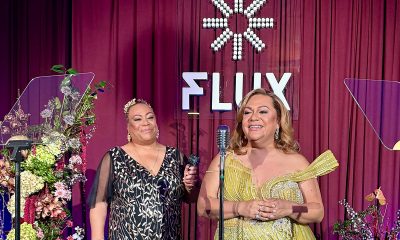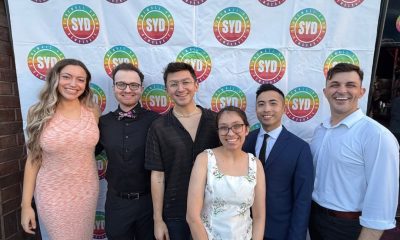West Hollywood
West Hollywood in brief- City government in action this week
National Poetry Month in April, Green Business Certification Program, Applications for Youth Scholarship Program plus more
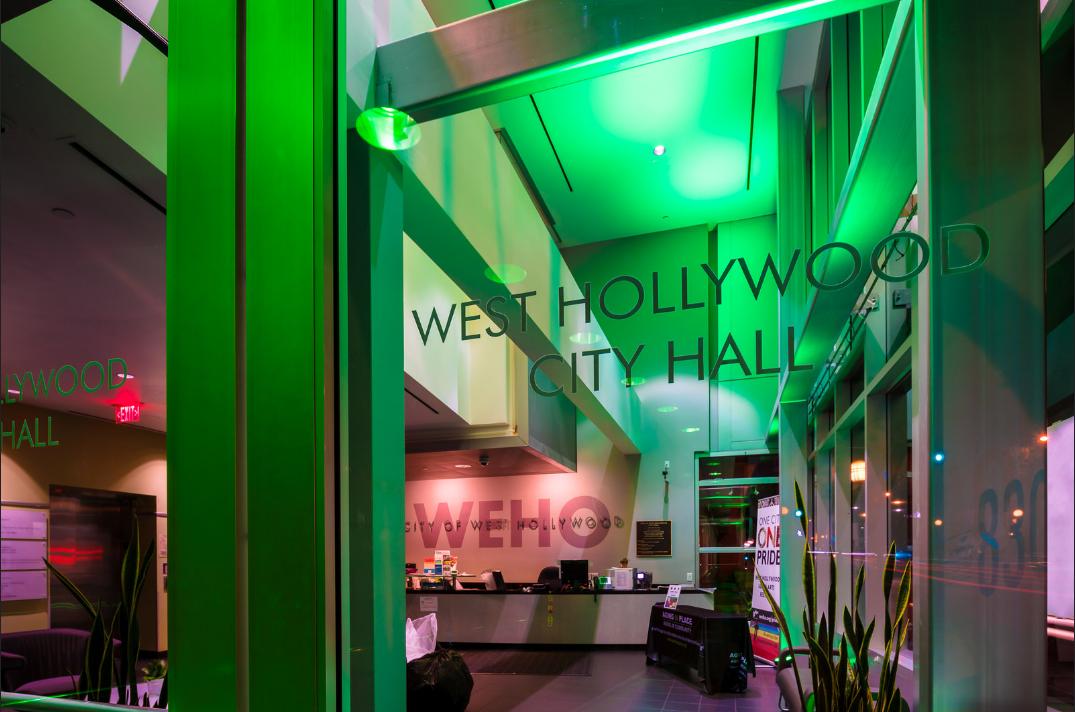
OUTLOUD Music Festival at WeHo Pride
WEST HOLLYWOOD – OUTLOUD Music Festival returns to the City of West Hollywood anchoring the entertainment of WeHo Pride’s weekend of programming. The electrifying three-day outdoor music festival will take place Friday, May 31, through Sunday, June 2, 2024, at West Hollywood Park. This year’s Saturday and Sunday headliners include Kylie Minogue, Janelle Monáe, and Diplo.
To purchase OUTLOUD Weekend or VIP Passes, visit www.weareoutloud.com. Passes will go on sale Friday, March 15, 2024, at 10 a.m. PDT, starting at $139 + fees for weekend General Admission and $249 + fees for weekend VIP. Individual day schedules and daily tickets will be released in the coming weeks. To find out additional information about WeHo Pride, visit www.wehopride.com.
Produced by award-winning events and entertainment agency JJLA, this year’s OUTLOUD Music Festival features a stellar lineup of queer entertainers and artists. The weekend’s full lineup of talent includes Doechii, Ashnikko, Noah Cyrus, Trixie Mattel (DJ Set), Keke Palmer, Channel Tres, Yaeji, Big Freedia, Sophie Ellis-Bextor and VINCINT, with exciting sets from emerging artists Snow Wife, Destiny Rogers, Black Polish, Salina EsTitties, Doug Locke, Jimi The Kween, and Zee Machine. OUTLOUD is hosted by personalities Ryan Mitchell, Hannah Rad, Arisce Wanzer, Neverending Nina, and Billy Francesca. The OUTLOUD Music Festival features a second dance music stage in partnership with SUMMERTRAMP, with more performances to be announced.
Previous artists OUTLOUD has welcomed to its main stage include Grace Jones, Adam Lambert, Carly Rae Jepsen, Years & Years, Jessie J, Lil’ Kim, Idina Menzel, Jessie Ware, Hayley Kiyoko, and more.
“West Hollywood is the epicenter of queer culture and entertainment, and we are a proud and vibrant hub where acceptance is embraced and diversity thrives,” said City of West Hollywood Mayor John M. Erickson. “The City of West Hollywood takes immense pride in fostering LGBTQ+ community and joy, and we’re excited to bring people together to celebrate at OUTLOUD and WeHo Pride. Not only will we showcase incredible queer talent, we will also embody the spirit of inclusivity and unity, which is the core of what defines our city.”
WeHo Pride Weekend will take place from Friday, May 31, 2024 to Sunday, June 2, 2024 and will include the free WeHo Pride Street Fair; WeHo Pride Presents Friday Night at OUTLOUD; the OUTLOUD Music Festival; the Women’s Freedom Festival; the Dyke March; and the WeHo Pride Parade.
Details about performers at WeHo Pride Presents Friday Night at OUTLOUD will be announced in the coming weeks.
WeHo Pride will kick off on Wednesday, May 22, 2024 with its José Sarria Drag Pageant on Harvey Milk Day. The WeHo Pride Arts Festival will take place from Friday, June 14, 2024 to Sunday, June 16, 2024.
WeHo Pride celebrations will include a diverse array of LGBTQ+ community group programming from May 22 to June 30 as part of visibility, expression, and celebration.
Since its incorporation in 1984, the City of West Hollywood has become one of the most influential cities in the nation for its outspoken advocacy on LGBTQ issues. The City has, for nearly four decades, been on the vanguard of efforts to gain and protect equality for all people on a state, national, and international level. With more than 40% of community members identifying as LGBTQ and four of the five members of the West Hollywood City Council identifying as LGBTQ, Pride is a deeply rooted part of West Hollywood’s history and culture.
In 2022, the City of West Hollywood inaugurated WeHo Pride. West Hollywood is a community of LGBTQ people from throughout the world who identify with the community’s deep connection to groundbreaking LGBTQ history and culture and hundreds of thousands of LGBTQ people and allies from around the world make West Hollywood their destination during Pride.
Details about WeHo Pride 2024 are posted as they become available at www.wehopride.com. OUTLOUD Music Festival information is posted at www.weareoutloud.com. Follow @wehopride on Instagram and Facebook and follow @officiallyoutloud on Instagram and Facebook. Sign up for WeHo Pride text updates by texting ‘Pride’ to (323) 848-5000.
For more information about WeHo Pride and the WeHo Pride Arts Festival, please visit www.wehopride.com/contact.
For more information about the OUTLOUD Music Festival, please visit www.weareoutloud.com/get-involved.
For inquiries to the City of West Hollywood’s Event Services Division, please email [email protected].
For people who are Deaf or hard of hearing, please call TTY (323) 848-6496.
City of West Hollywood Begins Accepting Applications for Youth Scholarship Program
The City of West Hollywood has opened applications for the 2024 Youth Scholarship Program. The program awards $2,000 to graduating high school students who are West Hollywood residents and who are pursuing a post-secondary education at an accredited college, university, or trade/vocational school. Students must have completed 150 verified hours of community service to be considered. The Youth Scholarship Program application period is open through Friday, May 10, 2024. The scholarship money can be used for any expense incurred in pursuing post-secondary education at an accredited college, university, or trade/vocational school.
To qualify for a youth scholarship, students must meet the following requirements:
- Residency – Applicant is a West Hollywood resident at the time the scholarship application is submitted and awarded. Please visit www.weho.org/city-government/contact-us/map-of-weho for a map of West Hollywood.
- Secondary Education – Applicant is a high school senior ready to graduate or an individual receiving a GED.
- Post-Secondary Education – Applicant is planning to attend a college, university or trade/vocational school and has proof of acceptance to a post-secondary institution.
- Community Service – Applicant has performed and provided verification of 150 hours of community service.
More information, application instructions, and the application link are available by visiting www.weho.org/youthscholarship.
The Youth Scholarship Program is organized by the City of West Hollywood, but scholarship funds come entirely from individual and community donations. The City has awarded more than 40 youth scholarships since the program began in 2007. To support the program, the City encourages donations from community members, organizations, and area businesses. Community members wishing to donate to the Youth Scholarship Program may do so at https://secure.qgiv.com/for/youthsco.
The City of West Hollywood’s Youth Scholarship Program is one of the first municipal government sponsored programs of its kind in the country. The Youth Scholarship Program recognizes the importance of education to our community and encourages and supports local students interested in pursuing their education beyond high school.
For more information please contact the City of West Hollywood’s Human Services Division at [email protected] or by calling (323) 848-6510.
For people who are Deaf or hard of hearing, please call TTY (323) 848-6496.
Next Steps in Log Cabin Renovation
The City of West Hollywood is moving forward with the next steps in the renovation of the historic Log Cabin building, which houses the West Hollywood Recovery Center (WHRC) on N. Robertson Boulevard. At its regular meeting on Monday, March 18, 2024, the City Council of the City of West Hollywood received a design update for the Log Cabin renovation project, which included direction to move forward with the design concept. High-resolution design renderings and current photos are available on the City’s official Flickr site. More information about the project, including a preliminary project schedule and FAQ, can be found on the City’s website: https://go.weho.org/logcabin.
The Log Cabin renovation plan provides a long-term facility for the West Hollywood recovery community, improves onsite health and safety, and meets accessibility and historic preservation standards. More than $7.5 million in funding has been provided to date to support renovations of this historic space, which is vital to safeguarding recovery services in the West Hollywood community.
The design upgrades will include:
- Expanded meeting rooms, food preparation areas, and storage capacity to support local recovery services;
- New mechanical, electrical, and plumbing systems, which help to contribute to an enhanced onsite experience;
- ADA-compliant bathrooms;
- Improved streetscape and landscaping; and
- New electric vehicle (EV) charging stations and solar panels.
The West Hollywood Recovery Center (WHRC) hosts more than 90 separate addiction recovery meetings a week, more than 4,500 meetings a year. For additional information about the WHRC, please visit https://thewhrc.org/home.
The Log Cabin building, itself, has a long and interesting history spanning nearly a century. The building was built on property purchased in 1928 by the City of Beverly Hills. The north portion of the property was leased to the Lions Club in 1936, which constructed the Log Cabin in its style as a Boy Scouts of America (“BSA”) clubhouse.
In the early 1970s, the Lions Club subleased the building to the West Hollywood Recovery Center for use for addiction recovery group meetings such as Alcoholics Anonymous meetings. In 2019, the City of Beverly Hills indicated its wish to sell the property and the City of West Hollywood entered into a lease with the City of Beverly Hills with the option to purchase the property. In 2022, the City of West Hollywood exercised its option to purchase the property and the City began a feasibility analysis with the West Hollywood Recovery Center to determine a renovation plan.
With the design concept approved, the City will take the next steps to move toward construction, which is anticipated to begin in October 2024. Construction is expected to be completed by December 2025.
For detailed information, please visit https://go.weho.org/logcabin.
For more information, please contact Alicen Bartle, City of West Hollywood Project Development Administrator, at (323) 848-6323 or at [email protected].
For people who are Deaf or hard of hearing, please call TTY (323) 848-6496.
West Hollywood Launches Green Business Certification Program As part of its WeHo Climate Action Plan
The City of West Hollywood announces the launch of its free Green Business Certification Program, which is one of the commitments in the City’s 2021 Climate Action and Adaptation Plan, WeHo Climate Action. The Plan outlines the City’s intended path to achieve carbon neutrality by 2035 and adapt to the impacts of a changing climate while centering equity and quality-of-life outcomes for the West Hollywood community.
The Green Business Certification Program will operate under guidelines established by the California Green Business Network (CAGBN), which connects approximately 50 California cities and counties to a statewide standard of criteria for businesses to achieve a Green Business Certification. In the state, more than 4,700 businesses have achieved CAGBN Green Business Certifications reducing 49.9 million kWh of electricity, 93.6 million gallons of water, 17.3 million pounds of materials from landfills, and 64.6 million pounds of greenhouse gas emissions.
Offering this program free of charge to West Hollywood businesses is one of a wide range of steps the City is taking toward attaining climate action goals. Each West Hollywood business that registers for the program can qualify to receive up to a $1,500 rebate to offset extra costs associated with implementing green measures. The City is working with local nonprofit organization Sustainable Works, which has administered green business programs for several Southern California cities since 2001. Sustainable Works will develop and administer the program. It has previously worked with the West Hollywood business community providing water efficiency and urban runoff prevention devices.
The Green Business Certification Program is designed to help businesses operate sustainably and receive public recognition for their efforts. Becoming a Certified Green Business requires implementing practices that reduce energy and water consumption, prevent pollution, divert waste from landfills, and assist businesses in creating a cleaner and healthier environment for their employees.
The City of West Hollywood’s Green Business Certification Program offers two certification tiers. Entry Level is an introductory certification for small businesses and Certification Level is for small or larger businesses, depending on capacity to make procurement changes and perform minor retrofits if needed. To achieve either level, businesses must implement a minimum number of measures in the areas of water and energy conservation, clean energy, waste reduction, pollution prevention, and sustainable transportation.
Green Business Certification is provided free of charge to West Hollywood businesses. Program coordinators provide step-by-step guidance to achieve criteria and connect businesses with resources and incentive programs available to help them go green.
For more information about the Green Business Certification Program and to register to participate, please visit go.weho.org/greenbusiness.
With a core value of Responsibility for the Environment, the City of West Hollywood has long been dedicated to sustainability and preserving our environment. For additional information about WeHo Climate Action, please visit www.weho.org/climateaction. To learn more about resources to Go Green, please visit www.weho.org/gogreen.
For more information about the Green Business Certification Program, please contact Christine Shen, City of West Hollywood Senior Planner, at (323) 848-6803 or at [email protected].
For people who are Deaf or hard of hearing, please call TTY (323) 848-6496.
West Hollywood Celebrates National Poetry Month in April
The City of West Hollywood will celebrate National Poetry Month in April with innovative events, including a poetry spa day and public exhibitions honoring poets and the art of poetry. National Poetry Month is the largest literary celebration in the world.
Throughout the month of April, the City of West Hollywood will honor living poets by featuring selections of their poetry on street pole banners along Santa Monica Boulevard. Currently, there are 49 poets honored, and each year the West Hollywood City Poet Laureate selects two additional poets to honor. This year’s honorees are Shonda Buchanan and Mariano Zaro:
- Shonda Buchanan is a Pushcart Prize nominee, Oxfam Ambassador, USC Los Angeles Institute for the Humanities Fellow, and City of Los Angeles (COLA) Department of Cultural Affairs Master Artist Fellow. She is the author of five books, including the award-winning memoir, Black Indian, which won the 2020 Indie New Generation Book Award and was chosen by PBS NewsHour as a “Top 20 Books to Read” to learn about institutional racism. About to enter a 3rd printing, Black Indian begins the saga of her family’s migration stories of Free People of Color communities exploring identity, ethnicity, landscape, and loss. Buchanan is also a faculty member in Alma College’s MFA Program in Creative Writing. Buchanan is the recipient of the Brody Arts Fellowship from the California Community Foundation, a Big Read grant from the National Endowment for the Arts, several Virginia Foundation for the Humanities grants, the Denise L. Scott and Frank Sullivan Awards, and an Eloise Klein-Healy Scholarship. Consulting Curator Poet for The Broad Art Museum, Buchanan is also a Sundance Institute Writing Arts fellow, a PEN Center Emerging Voices fellow, and a Jentel Artist Residency fellow.
- Mariano Zaro is the author of six books of poetry: Decoding Sparrows, Padre Tierra, Tres letras/Three Letters, The House of Mae Rim/La casa de Mae Rim, Poems of Erosion/Poemas de la erosion, and Where From/Desde Donde. His poems have been included in the anthologies Monster Verse, Wide Awake, The Coiled Serpent, and in several magazines in Spain, Mexico, and the United States. Zaro’s short stories have appeared in Portland Review, Pinyon, Baltimore Review, Louisville Review and Magnapoets. He is the winner of the 2004 Roanoke Review Short Fiction Prize and the 2018 Martha’s Vineyard Institute of Creative Writing Short Fiction Prize. Since 2010, he has been hosting a series of video-interviews with prominent American poets as part of the literary project Poetry.LA. He is a professor of Spanish at Rio Hondo Community College in Whittier.
On Monday, April 1, 2024 at 6 p.m., the City Council of the City of West Hollywood will issue a commemorative National Poetry Month proclamation, which will be received by West Hollywood City Poet Laureate Jen Cheng. The presentation will be viewable as part of the City Council meeting broadcast on the City’s WeHoTV YouTube Channel. The City Poet Laureate Jen Chang will also debut a new poem that celebrates the City of West Hollywood, titled Recipe for Creativity, Blessed by Ghosts of the Greats (below, at end of news release).
With the support of an arts grant from the City of West Hollywood, Women Who Submit (WWS) presents Transformation – A Book Release Party on Saturday, April 13, 2024, from 2 p.m. to 5 p.m. at Plummer Park’s Great Hall, located at 7377 Santa Monica Boulevard. Transformation is WWS’ third anthology and features poetry, fiction, creative nonfiction, and drama from 42 women and nonbinary contributors across the world. The event will feature readings from Erika Ayón, Lisa Cheby, Liz González, Monona Wali, Aruni Wijesinghe, and Sandy Yang, music by DJ Langosta, and an expo of literary organizations and booksellers. For more information, please visit the City of West Hollywood’s website calendar.
The WeHo Reads: Poetry Spa event will take place on Wednesday, April 17, 2024 from 6 p.m. to 8 p.m. at the Respite Deck of the West Hollywood Aquatic and Recreation Center (ARC), located at 8750 El Tovar Place, adjacent to the West Hollywood Library. From 6 p.m. to 7:30 p.m., the public is invited to explore poetry at “spa stations” including Feng Shui Poetry, Poemaroma (essential oils), Lotus Poetry (origami), and other poetic experiences. At 7:30 p.m., attendees will gather at the Grand Staircase at sunset to hear all the poets share their words. Poetry Spa is a concept created by Brian Sonia-Wallace during his term as 2020-23 West Hollywood City Poet Laureate and is curated by current West Hollywood City Poet Laureate Jen Cheng.
WeHo Reads is a literary series produced by the City of West Hollywood’s Arts Division and BookSwell. Additional support is provided by UCLA Extension Writers’ Program and Poets & Writers, with media partnerships from Book Soup and Los Angeles Review of Books. Books will be available for sale by historic West Hollywood retailer Book Soup. This event is free to attend and RSVPs are requested. For more information and to RSVP please visit: www.weho.org/wehoreads.
Poets participating at the WeHo Reads: Poetry Spa event include:
- Terry Wolverton, author of eleven books, including her latest, Season of Eclipse, hosts the Poemaroma spa station.
- K. Toney is a griot, writer, musician, and educator who hosts the Listening Libations spa station where attendees get to mix poetry with soothing sounds.
- Brian Sonia-Wallace, author of Poetry of Strangers hosts the Poetry Bath spa station.
- Pride Poets members Timothy Nang will host the Lotus Poetry spa station and Jose Rios will host the Poetry Bingo spa station.
- West Hollywood City Poet Laureate Jen Cheng hosts the Feng Shui Poetry spa station which guides attendees through the Five Elements.
Attendees will receive raffle tickets for a drawing to win a grand prize tote bag containing work from the poets which include Jen Cheng’s Braided Spaces, Timothy Nang’s Lotus Children, Brian Sonia-Wallace’s Maze Mouth, Terry Wolverton’s Ruin Porn, and A. K. Toney’s album Neo Griot & The Afrocentric Prince.
The community is also invited to visit Poetry Walk, a public art installation, located on the traffic median of Santa Monica Boulevard between Doheny and Almont Drives. This temporary public art installation, which was installed in April 2023, displays poetry next to pre-existing empty concrete plinths where sculptures are usually displayed. The poetry excerpts reflect on absence, longing, and that which is unseen or uncelebrated. Contributing poets are former West Hollywood City Poet Laureates Brian Sonia-Wallace, Steven Reigns, Kim Dower and Charles Flowers; and Tonya Ingram, a young poet who passed away in December 2022. The Poetry Walk can be experienced as written word or by listening to audio recordings. Members of the public were invited to submit their own short poems reflecting on absence, longing and the unseen, and select poems are posted on the City website.
During the month of April, with the support of an arts grant from the City of West Hollywood, Greenway Arts Alliance will present the 8th Annual LA Get Down Festival at the Greenway Court Theatre, located at 544 N. Fairfax Avenue in Los Angeles. Past years’ programming has included open-mics, workshops, poetry slams, performances, and more. As part of this festival, West Hollywood City Poet Laureate Jen Cheng welcomes the community to join her at the Greenway Court Theatre for a free writing workshop, Feng Shui Poetry, on Saturday April 20, 2024 at 12 p.m. More information and links to purchase tickets for the LA Get Down Festival can be found at https://greenwaycourttheatre.org/la-get-down.
The City of West Hollywood began formally celebrating National Poetry Month in 2015 after launching its City Poet Laureate program in 2014. The West Hollywood City Poet Laureate serves as an ambassador of West Hollywood’s vibrant literary culture and leads the promotion of poetry in the City, including assisting with its annual celebration of National Poetry Month.
For more information about the West Hollywood City Poet Laureate program or National Poetry Month activities, please contact Mike Che, the City of West Hollywood’s Arts Coordinator, at [email protected] or at (323) 848-6377.
For people who are Deaf or hard of hearing, please call TTY (323) 848-6496.
West Hollywood
John Heilman and Danny Hang will serve as WeHo’s new Mayor and Vice Mayor
Last night, community members and local officials gathered to celebrate new leadership and bid a warm farewell to outgoing Mayor Chelsea Byers.
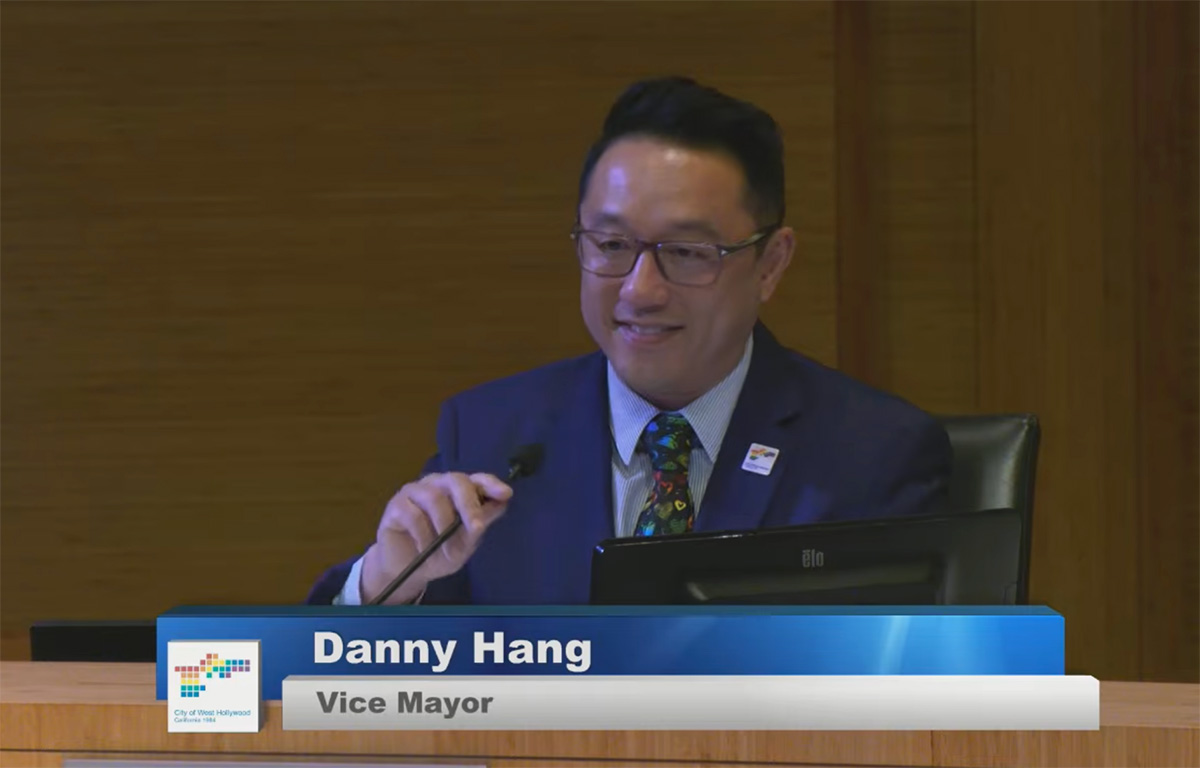
On Jan. 12, West Hollywood residents packed the City’s chambers at 6 p.m. to honor the work of outgoing mayor Chelsea Byers and witness councilmembers John Heilman and Danny Hang take their oath of office as they respectively assume their roles as Mayor and Vice Mayor for 2026.
In her last address as Mayor, Byers spoke about the optimism she holds onto in these unsteady times. To her, West Hollywood is a unique City: one that has become a model for what can be possible in an unjust society. “It’s us against the world. It’s West Hollywood on the stage,” Byers said. “It’s our story to tell, and every single person here contributes in such great ways to that.”
Byers was awarded a plaque on behalf of West Hollywood council members for her outspoken commitment to LGBTQ+ rights, economic justice, housing affordability, and policies that emphasize equity and inclusivity in West Hollywood.
Her leadership remains a bright, guiding light for Mayor Heilman, who was part of West Hollywood’s first city council after the independent city was incorporated in 1984. The spirit of that initial group remains today: queer, progressive, and led for and by the people. Yesterday’s ceremony marked the beginning of Heilman’s ninth time serving as Mayor, as well as his last year on the city council due to term limits.
Now, he leads side-by-side with a self-proclaimed “newcomer,” Danny Hang.
From the 626 to the Westside: Hang’s roots and journey
Hang was born in Monterey Park, a city in the San Gabriel Valley. The region is known for its diverse communities and AAPI-rich culture and history, and Hang recounted to the Blade the deep sense of belonging and comfort he felt growing up there. “I could go to a restaurant, speak Vietnamese or Chinese,” Hang said. “There are people who look like me out there. It is my home away from home.”
After college, he worked at the Social Security Administration, where he helped retirees, disabled people, and those impacted by loss file for Supplemental Security Income (SSI). The work was fulfilling, and he loved feeling that he had a tangible impact on others’ lives: that he could help residents grappling with difficult bureaucratic processes.
This passion grabbed the attention of L.A. County Supervisor Lindsey Horvath, who tapped Hang into serving on West Hollywood’s Disabilities Advisory Board in 2017. Hang eagerly accepted the role, having always been drawn to the vibrant, queer cultural hub. “WeHo was always the land of the unicorn: the land of magic,’ Hang told the Blade. “[This] was a town where I could be open, by myself, and find other people who were also LGBTQ+.”
After serving on the City’s Disabilities Advisory Board and, subsequently, the county’s Business License Commission, Hang noticed a lack of AAPI representation in local leadership. “There aren’t many AAPI people at all in West Hollywood. After I was on the commission, [I thought]: Hey, I think I want to run for city council,” Hang told the Blade.
Creating more inclusive leadership in WeHo
In 2024, Hang was elected to West Hollywood’s city council, becoming the first AAPI councilmember in the City’s 40 year legacy. “I want to see people who look like me in local government, because I want this community to be reflective of the modern-day people who live here. We’re a diverse community, and there’s no reason why we shouldn’t have people of color on the council, as well as more people of color appointed to our boards and commissions.”
Last night, local officials offered encouragement, support, and affirmation to Hang after he took his oath of office. “You’re already making history and certainly making waves across, not just your home region of the San Gabriel Valley, but certainly in California,” said Monterey Park councilmember Henry Lo.
Afterwards, Hang addressed the room, thanking residents, fellow council members and his family. “Standing here as the first AAPI elected to the West Hollywood City Council is deeply meaningful, and I couldn’t have done it without my parents. [They’re] right here in the front row,” Hang said. “My dad was a union worker, who showed me why standing up for workers matters. And my mom worked in a small business, owning a little nail salon in South Pasadena. She taught me what it means to care for others and to keep the community going.”
The year ahead: Heilman calls for residents to unite
Afterwards, Mayor Heilman spoke at length about the upcoming transitional year, the urgency of the current political climate, and ways that community members can step up to support each other. In his last term, he has set his eye on revitalizing the Sunset Strip, stabilizing rent and increasing housing affordability as well as examining the safety of the City’s foundational buildings, including the library and fire station.
He concluded his speech by making an unwavering stance on the “appalling” state of the federal government, stating that every West Hollywood resident must step up together in the face of ongoing federal attacks on the rights of LGBTQ+ people, specifically transgender people, as well as immigrants and other marginalized community members.
“This is a direct attack on our residents. It’s a direct attack on all of us,” Heilman said. “Now is not the time to hide. We need you…Ask what you can do to help people in the community,” he said, galvanizing residents to volunteer for the City’s various social services, nonprofits like Hollywood Food Coalition and Ascencia.
This call for unity and communal bravery echoes Byers’ belief in the courage of the people of West Hollywood. “41 years ago, a group of people defined what government could be,” Byers said. “We’re living the wildest dreams of people decades ago…and we get to be a bridge for that hope for the future. In such a critical moment, it’s truly our responsibility.”
Kristie Song is a California Local News Fellow placed with the Los Angeles Blade. The California Local News Fellowship is a state-funded initiative to support and strengthen local news reporting. Learn more about it at fellowships.journalism.berkeley.edu/cafellows.
West Hollywood
Administration refused to honor World AIDS Day; residents gathered with defiance, grief and love
Yesterday, members of the APLA Health Writers Group read moving stories to a large group of locals gathered at the AIDS monument.
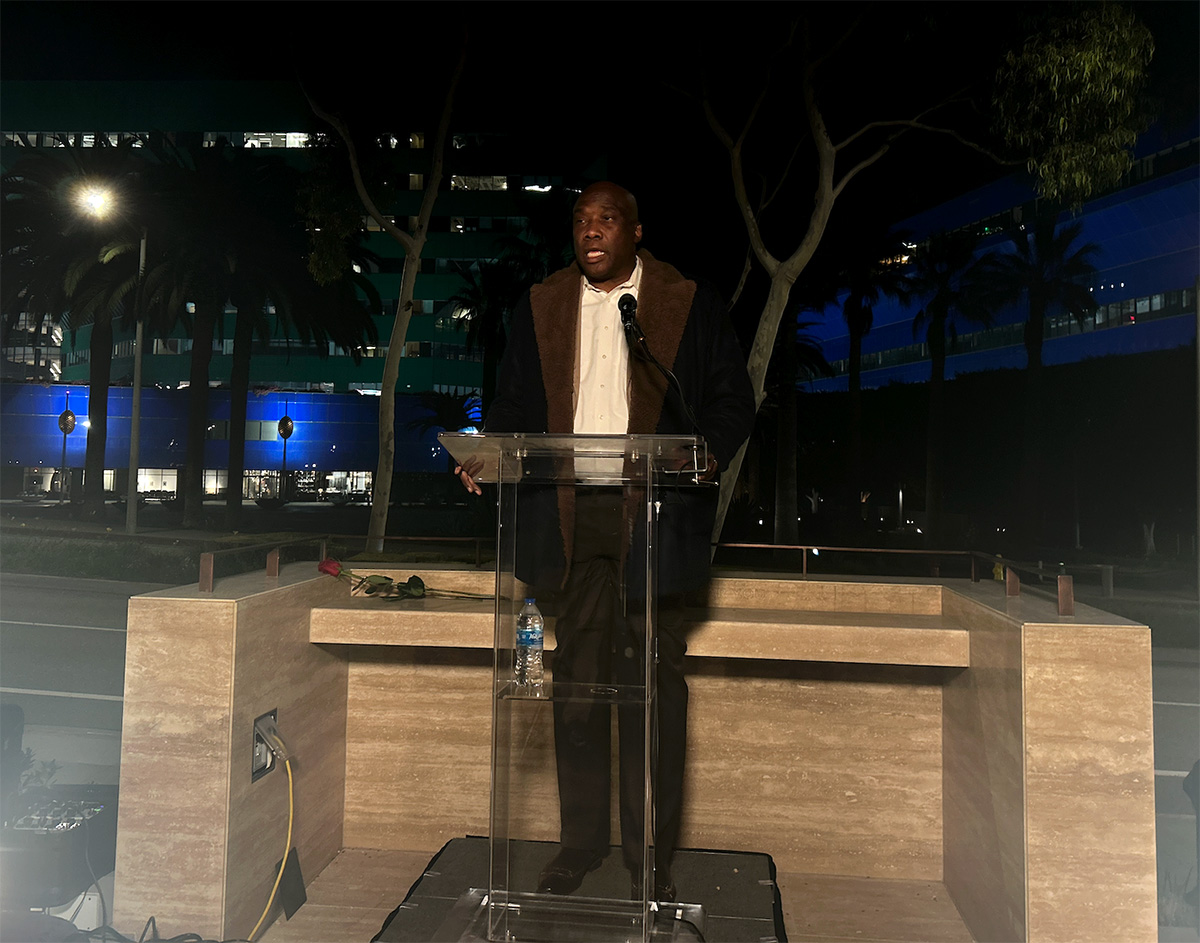
On Monday, the federal administration did not honor World AIDS Day, for the first time since the international awareness day was created in 1988. In addition to significant funding cuts to organizations focusing on HIV preventative treatment and care, the government’s halting of this commemoration perpetuates a dismissive system of inaction against LGBTQ+ people.
And yet, over 50 community members filled the empty spaces of West Hollywood’s AIDS monument yesterday evening, waiting in the night chill as city officials delivered impassioned statements and writers from APLA Health read personal pieces that centered a grief and love for those lost to the epidemic.
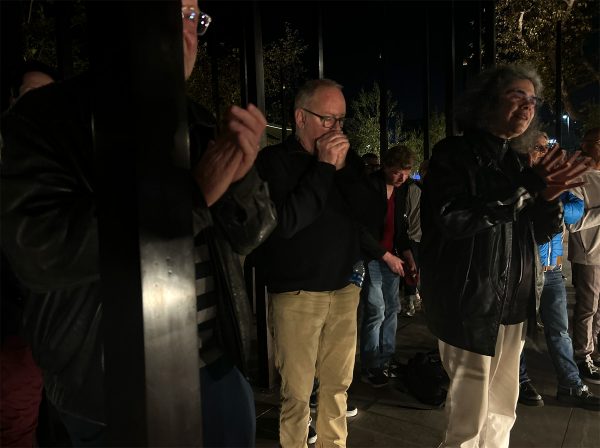
Before the readings began last night, West Hollywood vice mayor John Heilman asked for residents to join him in a righteous rage against administrative apathy. “I want to ask us all to reflect for just a moment about all of the people we lost…I want us to reflect and get angry,” said Heilman. “We have a fucking president who won’t even recognize World AIDS Day.”
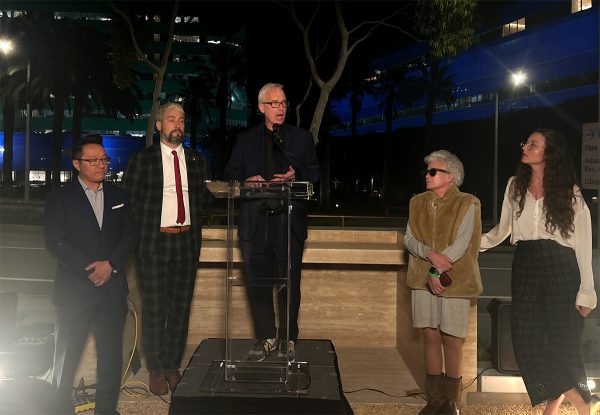
Irwin Rappaport, board chair for STORIES: the AIDS monument, echoed this immense disappointment. “Many of us here tonight lived through the 1980s, so we know what that’s like,” Rappaport said. “We also know that because of that neglect, because of that lack of caring from the federal government, we have to care for one another — and we know how to do that. When we don’t have recognition from others, we know how important it is to preserve our own history, to tell our own stories.”
Through heavy silence, five writers from APLA Health’s writers group stood tall before a podium and shared intimate writings they created about the epidemic and its personal impact on them. The collective was established in 1989 to provide an inclusive, expressive space for HIV-positive writers and allies to work on their writing and learn how to share their stories.
Writer Brian Sonia Wallace, who served as West Hollywood’s poet laureate from 2020 to 2023, has been working with the writers group for the last four years to help them hone and refine their narrative voices as they share their heaviest grief and the depths of their love for the people they lost to HIV and AIDS.
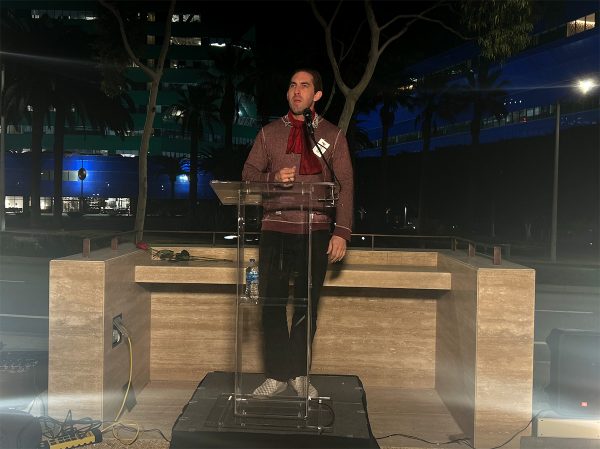
Hank Henderson, one of these writers, read from a diary entry from November 29, 1991. His voice, clear and strong, wavered as he shared about the death of his dear friend Richard. In a piece filled with lush, rich detail, painted clearly with a strong and loving voice, Henderson recounted a memory with Richard during the latter’s last years.
“The Santa Barbara sky is clear blue forever today…Yesterday came and went like a half-remembered dream between snooze alarms,” Henderson recited. “Last year, we walked to the beach. We spent hours there, played frisbee ourselves, brought the dog. Richard even yelled out 30-minute tanning turnover alarms. Yesterday, he took tiny, labored steps back to the car, used my shoulder to keep himself from falling over. Nobody said anything. We just pretend it’s normal.”
Another writer, Austin Nation, shared the story of being told he was HIV-positive at 26 years old. As a young nurse, he remembered the shock of seeing “young, beautiful men” arriving at the hospital covered in “purple, blotchy sores.” When he received his own test results, a paralyzing terror washed over his body. An incredulity followed the fear: why was this happening to him? “I got this thing for what?” Nation spoke. ”For having fun? For making love? And now it’s gonna cost me my life?”
But as he stood before the crowd, now 63 years old, he was met with applause and joy as he stated and repeated: “I’m still here. I’m still here.” The writers, in their grief and loss, have come to a place where they are able to share these stories, empowered and held. “In a world that writes off people with stories like mine,” Nation said. “It’s a hell of a good day to be alive.”
Kristie Song is a California Local News Fellow placed with the Los Angeles Blade. The California Local News Fellowship is a state-funded initiative to support and strengthen local news reporting. Learn more about it at fellowships.journalism.berkeley.edu/cafellows.
West Hollywood
West Hollywood kicks off community-focused programming for World AIDS Day
Since 1988, queer communities have come together on Dec. 1st to honor siblings and allies lost to the AIDS epidemic.
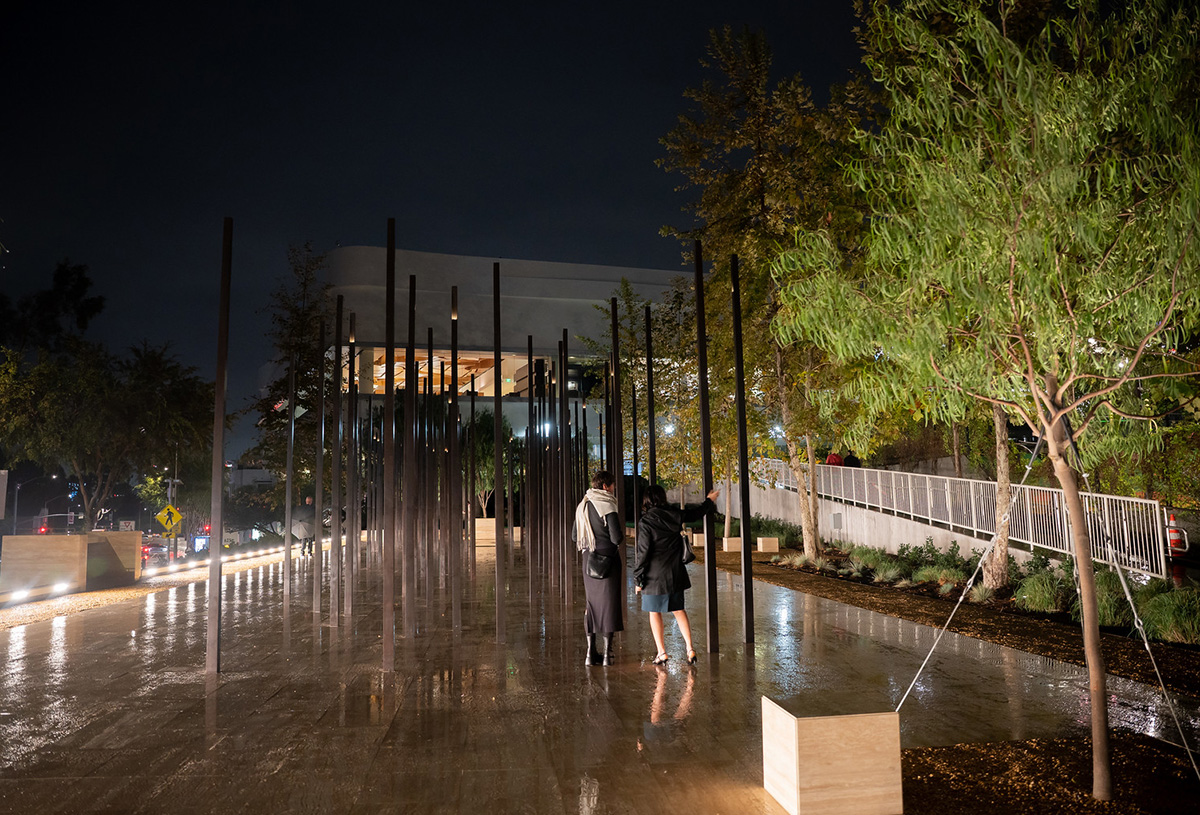
Since 1988, LGBTQ+ communities have come together on Dec. 1st to commemorate queer siblings and allies lost to the AIDS epidemic. This year’s World AIDS Day follows the theme “Overcoming disruption, transforming the AIDS response” and highlights the substantial funding cuts to research, health services, and community initiatives that have prioritized the safety of people with HIV and AIDS. The theme challenges people to think about “radical” ways to organize together and ensure that those who are impacted are able to access the care, treatment, and awareness that they need.
Beginning today, the City of West Hollywood is kicking off programming to recognize the historical transformation that local queer communities experienced during the AIDS epidemic. A panel from the AIDS Memorial Quilt will be available for viewing at the City’s Council Chambers at 625 N. San Vicente Boulevard through Monday, Dec. 15th.
Known as the largest community arts project in history, the Quilt is a powerful memorialization of loved ones who died during the epidemic. Each panel of the Quilt contains a story of remembrance, immortalizing a life cut short during the crisis. The project currently contains over 50,000 panels dedicated to over 110,000 people, all woven together in a 54-ton tapestry piece.
If you’re visiting the panel today, there will be an additional gathering opportunity tonight at the West Hollywood Park for STORIES: the AIDS Monument. From 5:30 to 8:30 p.m., members from the HIV-positive writers collective APLA Health Writers Group will present intimate readings that reflect on their experiences. Community members will be allowed time to wander through the monument and also preview the new Herb Ritts: Allies & Icons exhibition at ONE Gallery after the program. The art show includes striking black and white portraits of activists who stood in alliance with those most impacted during the AIDS epidemic.
Additionally, fresh flowers will be placed on the bronze plaques that line the City’s AIDS Memorial Walk. During the AIDS epidemic, West Hollywood was at the center of a rampant grief and loss that juxtaposed vibrant programming and efforts that boosted healing and fought against stigma and violence. It continues to be a vibrant space that houses various organizations and memorial spots that continue to uphold the revolutionary history and advocacy work that has continued since the epidemic’s beginnings.
Today, West Hollywood is in the process of executing its HIV Zero Strategic Plan, an initiative that began in 2015. Its goals include: expanding healthcare access for people living with HIV and AIDS, reducing the rate of infections, lessening health disparities and inequities for those impacted, and slowing the disease’s progress from advancing to AIDS.
According to West Hollywood mayor Chelsea Byers at a recent Cityhood event, the initiative carries forth the City’s “bold vision” and commitment to ensuring marginalized community members living with HIV do not face the life-threatening discrimination and health barriers that their elders experienced.
To learn more about the City’s programming, read here.
Kristie Song is a California Local News Fellow placed with the Los Angeles Blade. The California Local News Fellowship is a state-funded initiative to support and strengthen local news reporting. Learn more about it at fellowships.journalism.berkeley.edu/cafellows.
West Hollywood
Today, West Hollywood celebrates 41 years of queer cityhood
WeHo’s city officials are trying to preserve the fight for queer safety and rights that began decades before.
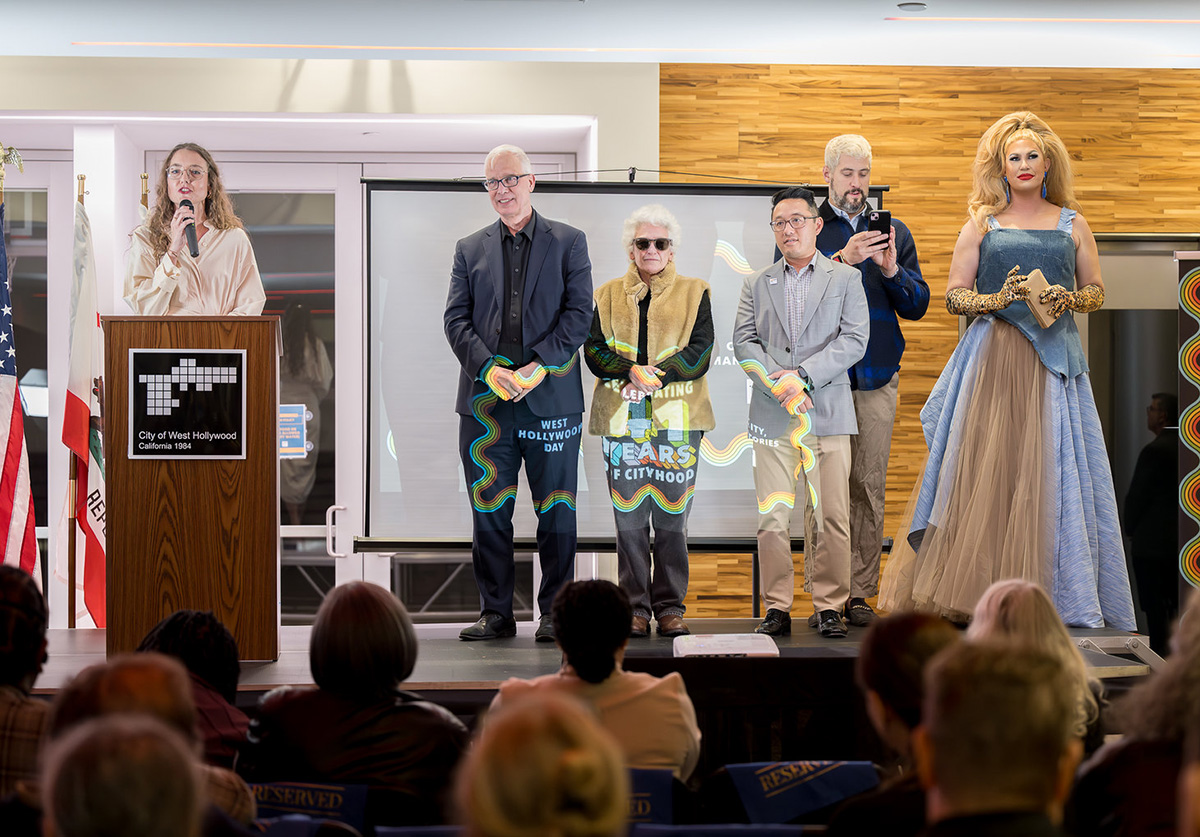
On Nov. 29th, 1984, West Hollywood was incorporated as an independent City, making its sovereignty official and solidifying it further as a sanctuary for LGBTQ+ community members, their stories, and their freedoms. Inspired by other prominent gay neighborhoods like New York’s West Village and San Francisco’s Castro District, West Hollywood was established by local queer advocates and residents. Their first city council was made up of a majority gay governing body — the first in the world, according to the West Hollywood History Center.
This political legacy, and the city’s vibrant and proudly queer history, continues to be preserved. On Monday’s celebratory event, West Hollywood mayor Chelsea Byers announced that the City’s current council “continues to be a majority-LGBTQ+ body,” holding tightly onto a “spirit” that reflects, prioritizes, and fights for Los Angeles’ queer community.
West Hollywood has been through various transformations, cocooning and revitalizing itself through the country’s evolving political and cultural upheavals. It has long been home to a ravishing nightlife that celebrates LGBTQ+ expression, and was a focal point for queer-led liberation and activism in the late 1960s and early 1970s. Trailblazers like Morris Kight led the first gay pride march through West Hollywood’s streets in 1970 and opened the Los Angeles LGBT Center to nourish the City’s robust and blossoming queer communities.
Today, West Hollywood continues to be the place where queer organizers and residents plant roots. Earlier this month, STORIES: the AIDS monument opened up in the City’s park after over a decade of work, shining a light on the legacies of gay activists, artists, historians, and community members who fought to survive as anti-gay stigma led to the erasure of their rights and lives.
As waves of anti-LGBTQ+ hate and violence continue to surge through the country, West Hollywood elected officials aim to continue doing the critical work that began decades before them: the work that protects the ability of queer residents to advocate for themselves, to live with protections and dignity, and to relish in joy. Mayor Byers is inspired by the resilience of the community members who stood together to establish this independent City in 1984. “The people who lived here…wanted a city with strong protections for renters, with progressive policies, and with a local government that would actually reflect and protect the people who call this place home,” said Byers, at the Nov. 24th celebration.
Over 40 years later, these needs have not changed. The way forward? Remembering and fighting for that initial promise and hope. “We are a chorus. We are a tapestry,” said Byers. “We are the product of thousands of people who, for more than four decades, have dared to say: We can build something better here.”
Kristie Song is a California Local News Fellow placed with the Los Angeles Blade. The California Local News Fellowship is a state-funded initiative to support and strengthen local news reporting. Learn more about it at fellowships.journalism.berkeley.edu/cafellows.
West Hollywood
From nickname to reality, the Rainbow District is made official by the City of West Hollywood
The mile along Santa Monica Boulevard from N. Doheny Drive to N. La Cienega Boulevard welcomes residents and visitors to come as they are
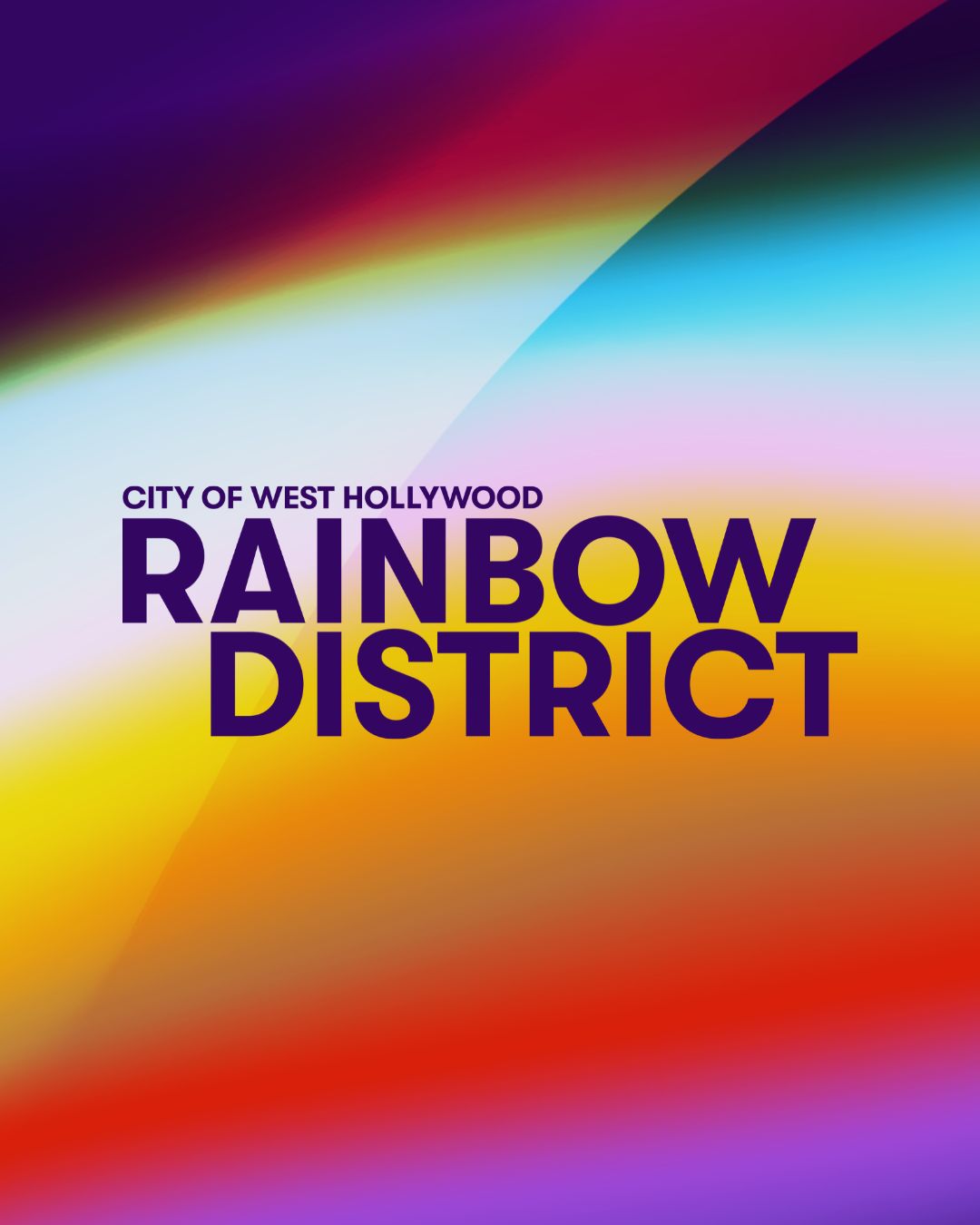
Even in today’s political climate, we will not be hidden.
The vibrant stretch on Santa Monica Blvd of over 50 local businesses, representing the full spectrum of LGBTQ+ expression, from N Doheny Dr to N La Cienega, has had the loving nickname of the Rainbow District for decades. Well, now it’s official. From nightlife to restaurants to community organizations, the City of West Hollywood has formally designated the space as such, honoring the neighborhood’s legacy as a safe haven for the queer community and beyond.
In addition to making the name official, the Rainbow District is being launched with a full range of social media, including Instagram, TikTok, and Facebook, keeping the residents and visitors updated on all upcoming events and happenings in the neighborhood.
Long known as a beacon of acceptance, inclusion, and visibility, where everyone is welcome, this iconic mile-long corridor is now formally recognized for what it has always been: a place where people from every walk of life can come together, be themselves, and celebrate the beauty of diversity.
City of West Hollywood Mayor Chelsea Lee Byers states, “For generations, the City of West Hollywood’s Rainbow District has been a place where LGBTQ+ people take their first steps into living openly, where the warm embrace of community is found at every turn, and where the joy of living out, loud, and proud fills the streets. The City’s official designation of the Rainbow District honors both the legacy and the future of this vibrant neighborhood, home to beloved entertainment venues, bars, and restaurants that have long served as cornerstones of LGBTQ+ life. Today, the Rainbow District is more alive than ever, and it will always stand as a beacon of hope, pride, and belonging and as a reminder that everyone deserves a place to celebrate joy, to be seen, and to be supported.”
The Rainbow District officially joins a nationwide list of iconic LGBTQ+ landmarks. West Hollywood will not be hidden amid political backlash and will continue to protect queer spaces, uplift queer voices, and foster a safe and joyful environment for all.
“This designation is not only a celebration, but it also serves as a promise,” said Visit West Hollywood President & CEO Tom Kiely. “A promise to keep LGBTQ+ spaces visible, valued, and vibrant for generations to come. As the Rainbow District continues to evolve, it will remain a place where locals and visitors alike can connect through culture, creativity, and community. The City’s formal designation affirms its significance and highlights The Rainbow District as the ultimate playground for travelers seeking a unique, inclusive, and authentic experience.”
The Rainbow District will be home to upcoming community events that include:
- Winter Market & Ice Skating Rink — December 2025
- Go-Go Dancer Appreciation Day — March 2026
- Harvey Milk Day — May 22, 2026
- WeHo Pride Weekend & the OUTLOUD Music Festival at WeHo Pride — June 5–7, 2026
Follow the Rainbow District on socials to discover local happenings, support small businesses, and be part of a neighborhood that celebrates every person for exactly who they are.
Instagram: @RainbowDistrictWeHo TikTok: @RainbowDistrictWeHo
Facebook: facebook.com/rainbowdistrictweho More Info: visitwesthollywood.com/rainbowdistrict
West Hollywood
West Hollywood’s AIDS Monument preserves the pain and power of people lost to the crisis
STORIES: The AIDS Monument is now available to view at West Hollywood Park, 15 years after its conception.
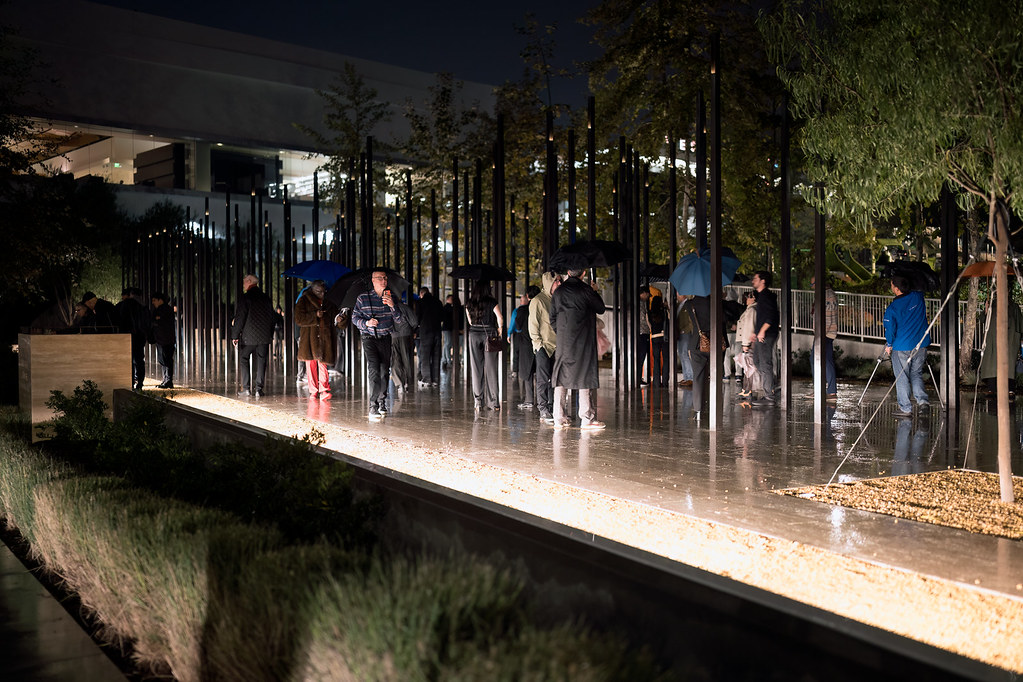
It was 1985, at the height of the AIDS crisis, when Irwin Rappaport came out as gay. As he came to terms with his identity, he witnessed people around him grow weaker: their faces becoming gaunt, painful lesions developing on their bodies. Five years later, he began volunteering as a young lawyer at the Whitman-Walker Clinic, a community health hotspot in Washington, D.C. that created the first AIDS hotline in the city, opened homes for patients with AIDS, and distributed materials that promoted safe sex.
The work being done at the clinic was instrumental, essential, and deeply painful. “When you see that sickness and experience that death among your friends and people you know, and when you’re writing wills for people who are much too young in ordinary times — it has an impact,” Rappaport told the Blade. “And even though in 1996 we saw life-saving medications come around, you never forget the sense of fear that permeates your life. The sense of loss.”
Determined to honor and share the legacies of people who died from AIDS, Rappaport joined the Foundation for the AIDS Monument (FAM) board to work towards the organization’s goal of creating a physical monument dedicated to memorializing these histories. FAM treasurer Craig Dougherty first conceived of this project in 2010 and, after 15 years, STORIES: The AIDS Monument is now available to the public for viewing.
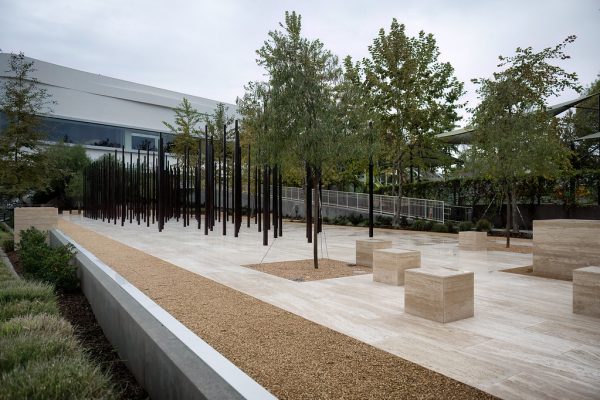
Created in collaboration with the City of West Hollywood, STORIES: The AIDS Monument is composed of 147 vertical bronze pillars known as “traces.” Designed by artist Daniel Tobin, 30 of these traces are engraved with words like: activism, isolation, compassion, and loss, which correlate to the over 125 audio stories collected and archived on the foundation’s website. This multimodal storytelling allows people who come across the monument to engage more intimately with the people represented by these physical pillars.
At nighttime, lights transform the monument into a candlelight vigil, providing a warm glow to a wanderer’s journey through the structure.
When people were able to walk around the traces at Sunday’s grand opening ceremony at the Pacific Design Center, the last remnants of the weekend’s rainstorm created a kind of “spiritual” and reverent atmosphere for those gathering, according to Rappaport. “I think there’s a certain peacefulness and serenity about the design, an opportunity for reflection,” he continued. “For some, it may bring back incredibly painful memories. It might bring back wonderful times with friends who are no longer here. It might remind them of their own caregiving or activism, or the sense of community that they felt in striving with others to get more attention to the disease.”
Now that the monument has been built, FAM has passed the mantle of management and programming to One Institute, a nonprofit that engages community members with queer history through panels, screenings, and other educational initiatives. One Institute plans to host monthly docent tours, art installations, and other special events during various LGBTQ+ national awareness days, including the upcoming World AIDS Day in December.
Rappaport also hopes to do outreach with local schools, so that young students are able to engage with the monument, learn about the people who were affected by the AIDS crisis, and interact with the ripples of transformation that this time period sparked in politics, research, the arts, and within society. “For younger people, I think [this is] an invitation for them to understand how they can organize about issues that they care about,” Rappaport said. “[So] they can see what the HIV and AIDS community did as a model for what they can do to organize and change the world, change culture, change law, change politics, change whatever they think needs to be changed. Because we had no other choice, right?”
West Hollywood
West Hollywood invests $1 million to build LGBTQ+ Olympic hospitality house
Pride House LA/WeHo will be an interactive space for queer athletes and allies to celebrate the 2028 Summer Games together.
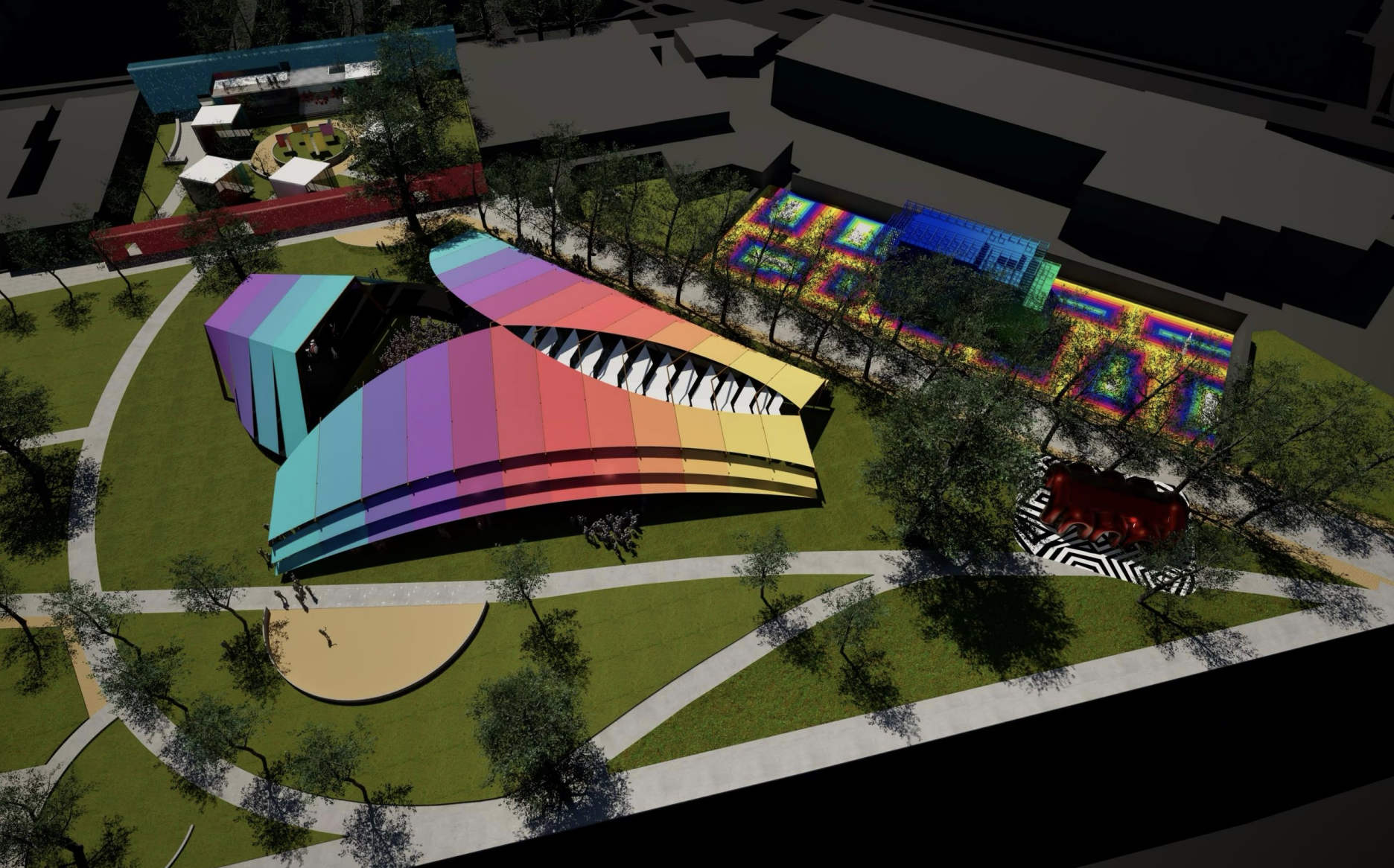
The first-ever Olympic hospitality house began with humble roots in 1992: a tent pitched on the Port of Barcelona for athletes to gather with their families. Since then, they transformed into fixtures of several major sporting events, with hopes of fostering belonging and safety for athletes of various cultural backgrounds.
It wasn’t until 2010 that the first LGBTQ+ hospitality house, the Pride House, appeared during the Winter Olympics in Vancouver. Over the years, its existence and visibility have faced barriers. During the 2014 Sochi Winter Olympic Games in Russia, Pride House International was denied from organizing its safe hub. The rejection was a blow to the visibility and safety that the organization was trying to promote and create for queer athletes. But this didn’t go unnoticed. International fans demonstrated quiet resistance, hosting remote Pride Houses in support of the Olympians who were barred from openly communing and celebrating together.
As Los Angeles prepares to host the Summer Olympics in July 2028, Pride House is coming back stronger than ever. In early October, the West Hollywood city council approved an agreement that would allocate $1 million to sponsor Pride House LA/WeHo as they prepare to build a temporary structure at West Hollywood Park for the 2028 Games. For 17 days, vibrant LGBTQ+ sports programming will fill the park’s grassy knolls.
Pride House LA/WeHo CEO Michael Ferrera detailed at a Nov. 1st Out Athlete Fund fundraising event that the team plans to build a concert stage to seat over 6,000 people. There will also be a museum that will take viewers through 100 years of queer Olympics history, viewing areas for people to watch the games, and a private athlete village for queer Olympians. “The dream of that is — imagine you’re an athlete from a country where you can’t be out,” said Ferrera. “You come here, and you can be safe and sound.”
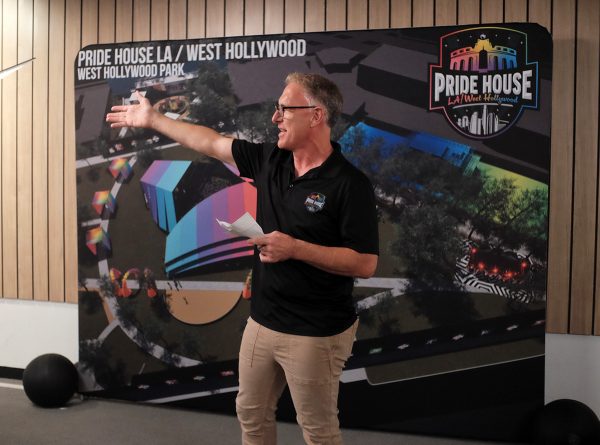
As outlined in the city council agreement and stated by Ferrera, most of the programming will be free and open to the public, and in the heart of a neighborhood that many of the county’s queer residents recognize as their safe haven. “We’re centering this important event in West Hollywood Park where our community has come together for decades in celebration, in protest, to support each other and to live our lives,” Pride House LA/WeHo CEO Michael Ferrera wrote to the Blade. “There is no place that is more representative of inclusion and safe spaces.”
The City of West Hollywood is promoting this inclusion further by asking for local community members to voice their perspectives on the formation of Pride House LA/WeHo at West Hollywood Park. On Monday, a community conversation will take place at Plummer Park to encourage residents to help shape the cultural programming that will take place in the summer of 2028. Another conversation will take place on Nov. 21st at the City’s 40th anniversary of Cityhood event.
“We couldn’t do this without the generosity and partnership of the city of West Hollywood,” Pride House LA/WeHo marketing co-lead Haley Caruso wrote to the Blade. “We are so happy to help bring the Olympic spirit to West Hollywood while also providing the community a safe and entertaining venue to enjoy the Games.”
Head to PrideHouseLAWeho.org for more information
West Hollywood
Drag performers delight Carnaval crowds with demure and daring dances
The Halloween party is one of the most anticipated events for queer Angelenos.
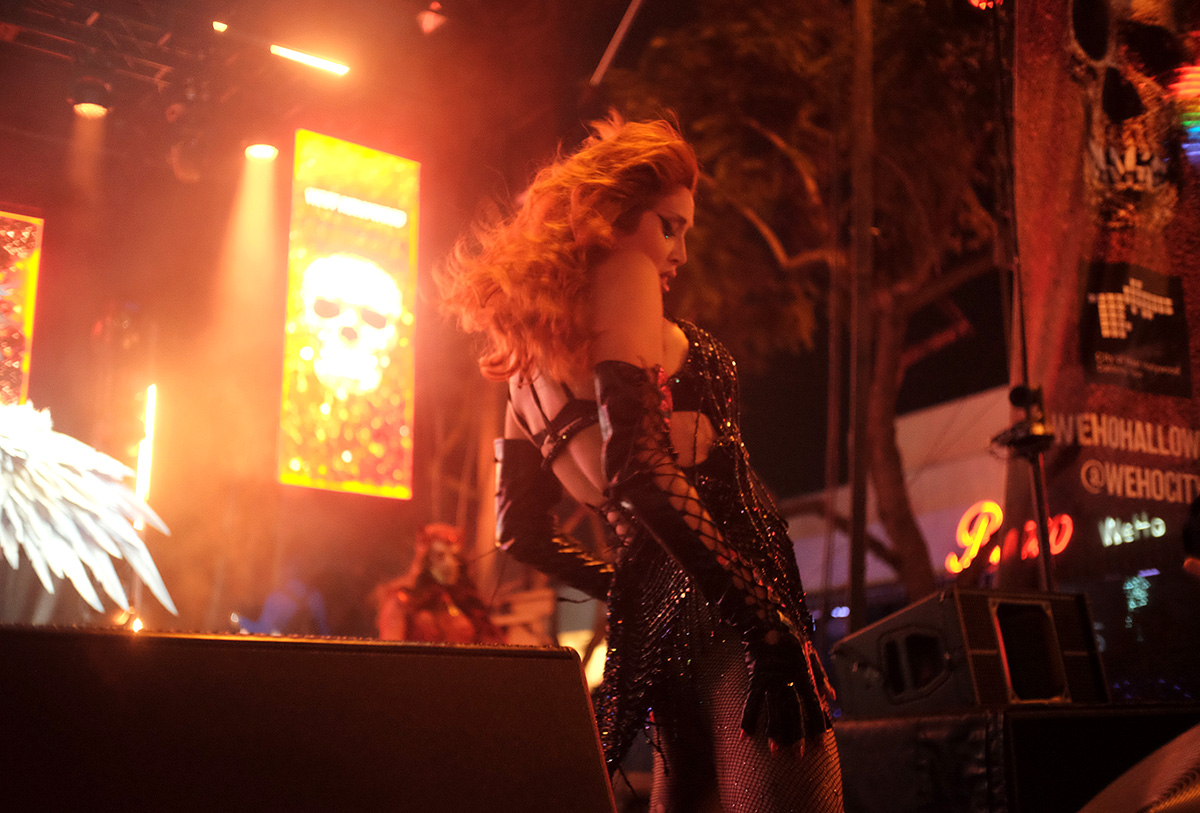
On Friday night, techno pop remixes surged through a tight block on Santa Monica Boulevard, where hundreds of eager partygoers danced near a pop-up stage. Bass-heavy grooves echoed across neighboring streets as Beetlejuices, angels, and vampires swayed and thumped to the beat.
Oct. 31 marked the arrival of West Hollywood’s annual Halloween Carnaval, one of the county’s citywide celebrations — and one of the most anticipated for queer Angelenos.
The first Halloween Carnaval was celebrated in 1987, and has since become one of the most awaited nights for local queer celebration. Drag performers donning elaborate costumes and glamorous makeup set the stage ablaze as they strutted, flipped their hair and danced to the cheers of a crowd that grew enormously as the night went on. The energy was infectious, and the Los Angeles Blade was on the scene to photograph some of these moments.
Image captures by Blade reporter Kristie Song.
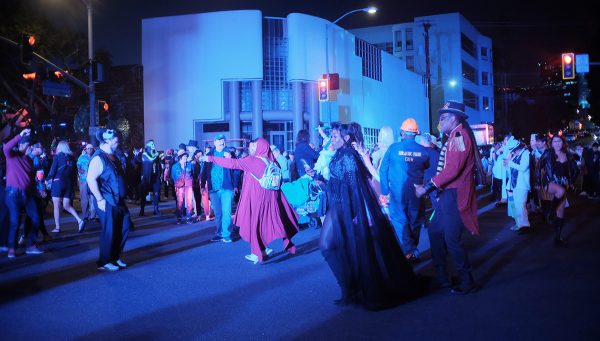
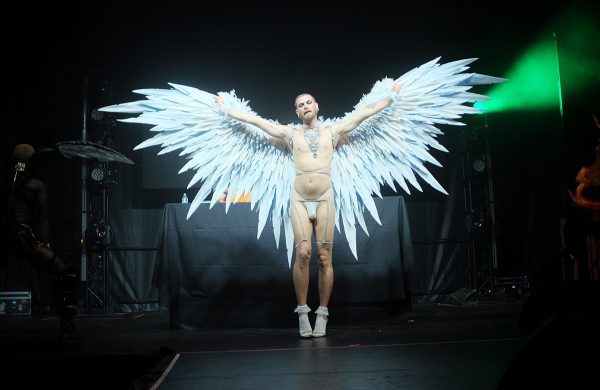
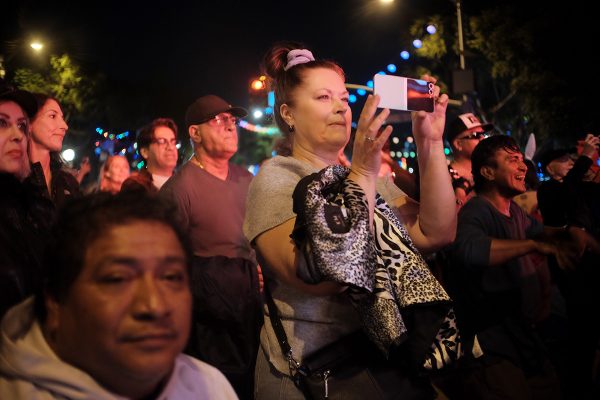
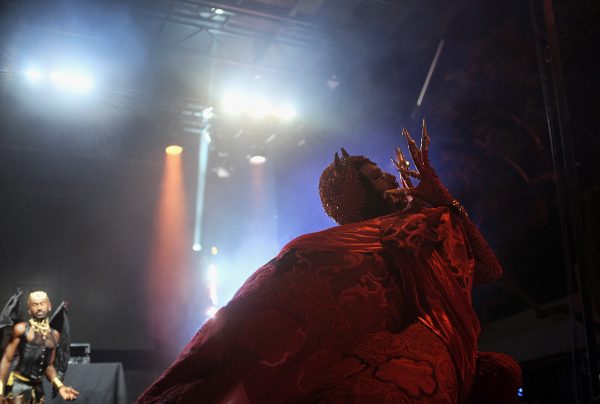
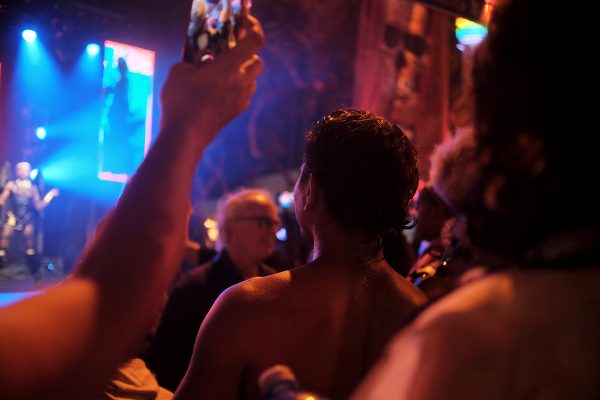
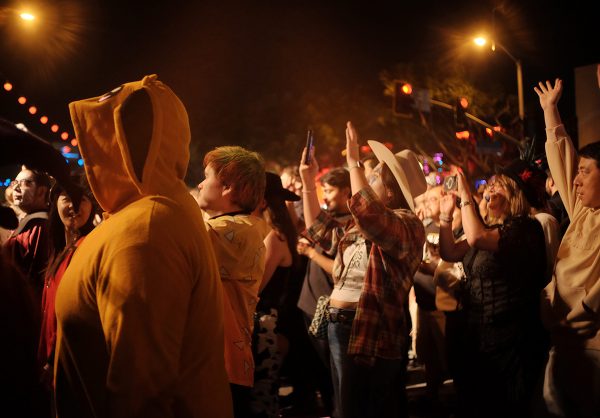
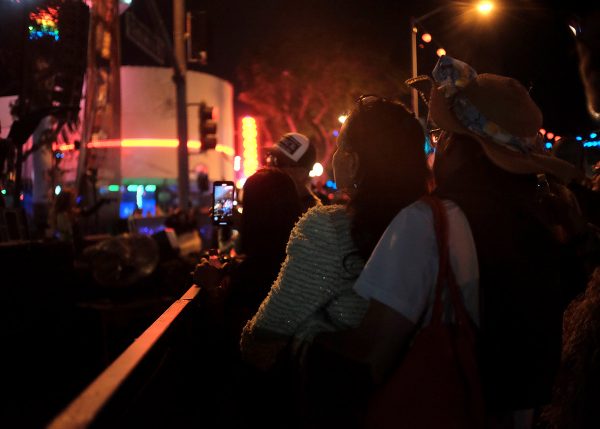
West Hollywood
West Hollywood installs new intersex pride flags on Intersex Awareness Day
On Sunday, city councilmembers gathered to raise two new pride flags to honor intersex community members
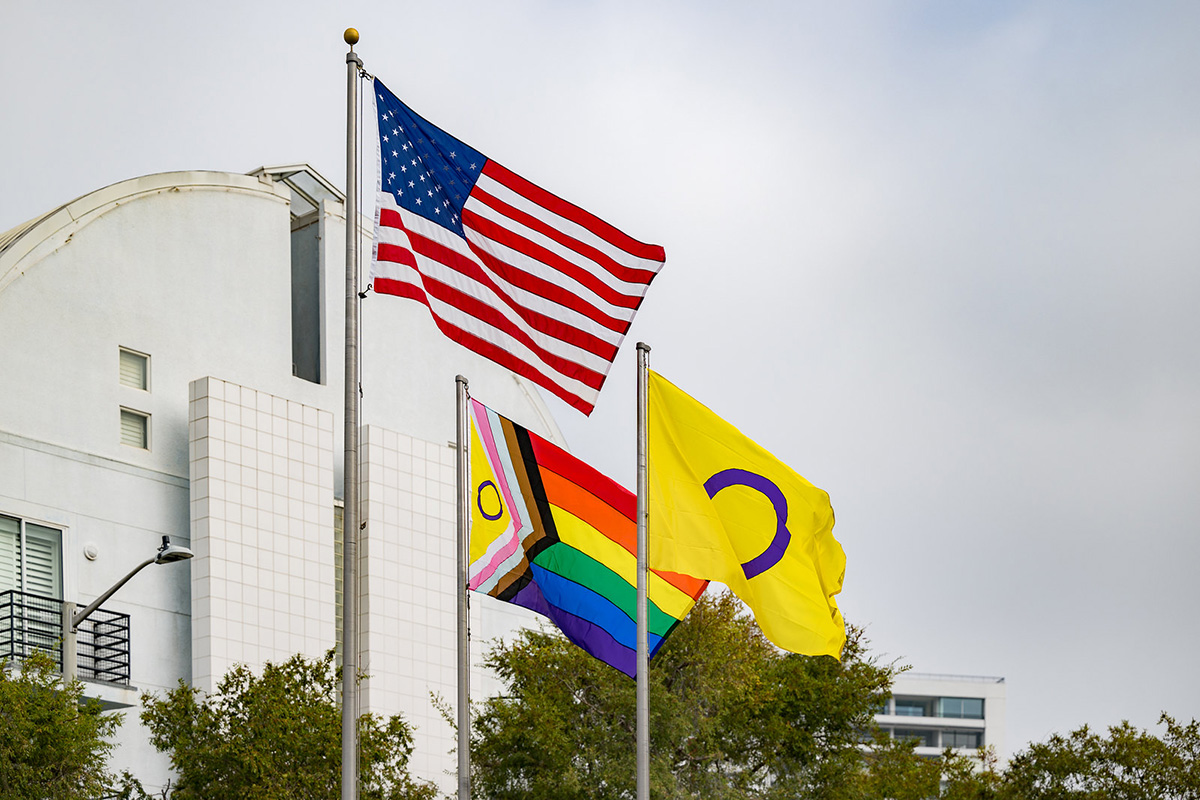
Early yesterday morning, on National Intersex Awareness Day, West Hollywood mayor Chelsea Byers, Vice Mayor John Heilman, as well as councilmembers Danny Hang and John M. Erickson gathered to install and raise two new intersex pride flags. They fly side by side with the American flag, upholding the City of West Hollywood’s vision of solidarity between national pride and LGBTQ+ visibility.
“We are facing unprecedented attacks on our community. It is important that we recognize the entirety of the LGBTQI+ community,” Vice Mayor John Heilman wrote to the Blade. “Intersex people have long been ignored and their issues disregarded. Raising the intersex flag also raises awareness about the challenges many intersex people face.”
Intersex people are born with naturally occurring variations in reproductive and sexual anatomy that don’t fit into binary “male” or “female” categorizations. As Planned Parenthood details, this can look like having both ovarian and testicular tissues or having combinations of chromosomes that aren’t “male” or “female,” just to name a few. According to the Human Rights Campaign Foundation, one of the biggest issues intersex people face is non-consensual surgeries performed when they are children. These operations are considered medically unnecessary and can leave lasting physical and psychological damage on intersex youth.
The fight for bodily autonomy and intersex visibility was the main reason behind the first action organized by intersex advocates and trans allies on Oct. 26th, 1996. Protestors stood outside the Boston Convention Centre, passed out leaflets, and spoke with clinicians, nurses, and other medical professionals attending the annual American Academy of Pediatrics conference.
One of the main leaders behind this movement was Morgan Holmes, an intersex woman who had experienced a violating medical procedure meant to “correct” her anatomy. In May of 1996, she presented testimony in a room adjacent to a symposium on genital surgery for intersex infants, a conference she and other members of her advocacy group had been rejected from.
“What I am saying is that my medical ‘care-givers’ failed to respect my autonomy or my intelligence when they assumed that because I was a child, they could do whatever they wanted as long as my father provided his consent,” Holmes said. “And when I began to balk, instead of questioning their own treatment of me, they blamed my body, and they cut it up.”
Today, intersex people and their stories are more broadly recognized, but still struggle to reach mainstream audiences when it comes to discussions around LGBTQ+ identity. West Hollywood city officials see this addition of intersex pride flags as a step forward. “Updating our city’s flags was my item because visibility matters,” councilmember John M. Erickson wrote to the Blade. “Intersex people have always been part of our story, and it’s time that their history, identity, and pride are recognized in the public spaces that belong to all of us.”
West Hollywood
Residents remain dubious as officials claim “no ICE involvement” at The Abbey
The Oct. 17th “undercover operation” was addressed at the latest city council meeting
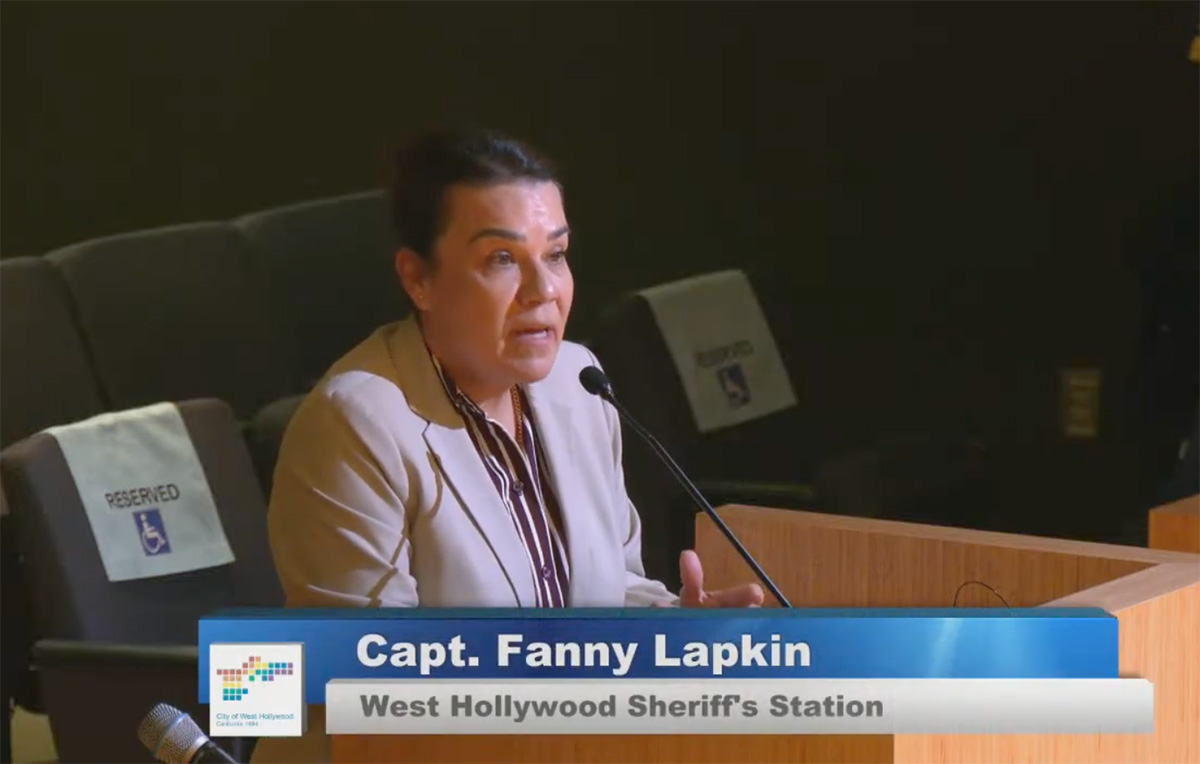
On Friday, Oct. 17th, West Hollywood gay bar The Abbey found itself in the center of a social media storm as clips were shared depicting the presumed presence of federal Immigration and Customs Enforcement (ICE) officers. In a video posted on Oct. 18th by Charles Hernandez, who often creates content around gay nightlife in Los Angeles, several people are seen standing in a line as they are apprehended and handcuffed by officers wearing sheriff’s vests and tees. Hernandez noted that, while dressed in varying attire with the word “sheriff” on it, none of the officers were willing to identify themselves or present their badges upon request.
Hernandez can be heard asking the officers about the cause for arrest, to which one responded: “I don’t have to tell you our cause.” The video creator also questioned another officer, who can be seen wearing a gaiter to cover his face. “Isn’t it illegal to wear a mask in California?” Hernandez asked. “He has COVID,” an officer replied. In September, Governor Newsom signed five bills that weakened federal agents’ abilities to access school sites and health facilities, and prohibited them from hiding their identities. More specifically, SB 627 requires all California law enforcement agencies to create written policies limiting their officers’ use of facial coverings by July 1, 2026.
As this video circulated around the web, the West Hollywood Sheriff’s Station released an online statement of their own, denying allegations that the officers present were federal immigration officers. The station also claimed that the night’s events were a result of an “undercover operation” that was conducted in response to reports made about pickpocketing and the transportation, use, and sale of illegal substances. “Several arrests were made,” the statement read. “ICE was not involved.”
Still, residents remained unconvinced, criticizing the station’s lack of transparency, careful conduct, and accountability. Over 50 people took to the comments of this statement to voice their discontent. “[It] was not that long ago when officers would raid LGBTQ spaces and arrest people simply for being there,” one comment read. “A raid such as this does not inspire feelings of safety for our community. Especially in times when people are being kidnapped off the street by masked federal agents. There simply must be a better response to pickpockets and “other criminal activity” than undercover raids by masked officers and transporting detainees in unmarked vehicles. DO BETTER.”
Two days later, at the West Hollywood city council meeting, West Hollywood Sheriff’s Station Captain Fanny Lapkin took to the podium to address some of these concerns. Echoing the station’s Instagram statement, Lapkin confirmed that the “pre-planned operation” was created in response to “concerns from our businesses and our community in regards to the pickpocketing, to the narcotics, and also to the illegal vending and some of the criminal activity during illegal vending.” Lapkin also confirmed that no federal agents were present, stating that everyone who took part in the operation was “sheriff’s department personnel.” And because the arrests were made as part of a planned operation, Lapkin further stated that warrants were not “necessary.”
The events were discussed with brevity at the meeting, but community ire has not been dispelled. Several people continue to question the ethics of this undercover operation: Why were the individuals being arrested not clearly told the reason for their detainment? Why were unmarked vehicles present? Why conduct the operation in this way, as Los Angeles neighborhoods continue to stay on high alert over immigration raids? These questions remain unanswered as more specifics about the operation have yet to be released.
-

 a&e features4 days ago
a&e features4 days agoTello Films: Celebrating 19 years of lesbian storytelling
-

 Mexico11 hours ago
Mexico11 hours agoUS Embassy in Mexico issues shelter in place order for Puerto Vallarta
-

 Movies1 day ago
Movies1 day agoRadical reframing highlights the ‘Wuthering’ highs and lows of a classic
-

 Movies5 days ago
Movies5 days agoEva Victor winning best screenplay, Erin Doherty winning supporting actress, and more queer highlights of the 2026 Film Independent Spirit Awards
-

 Features3 days ago
Features3 days agoWhat’s next for “local hero” and longtime queer ally Genevieve Morrill
-

 a&e features3 days ago
a&e features3 days agoLiveplay series ‘Gladlands’ finds hope in the unlikeliest of places
-

 a&e features2 days ago
a&e features2 days ago‘Pee-wee as Himself’ and ‘Lurker’ directors on how queer audiences have reacted to their Spirit Award-winning films

